
Related
Guests
- Dr. Juan AlmendaresHonduran medical doctor and award-winning human rights activist. He is the president of the Honduran Peace Committee, as well as the past secretary of the Coordinating Committee of Popular Organizations. He was an opposition candidate with the Democratic Unification Party during the last presidential elections.
The ousted Honduran President Manuel Zelaya is expected to meet with US diplomats in Washington today before attempting to return to Honduras Thursday, five days after being deposed by a military coup. Meanwhile, the streets in Honduras remain tense, and the crackdown on the media has reportedly not been lifted. We go to Honduras to speak with human rights activist, Dr. Juan Almendares. [includes rush transcript]
Transcript
JUAN GONZALEZ: The ousted Honduran President Manuel Zelaya is expected to meet with US diplomats in Washington today before attempting to return to Honduras Thursday, five days after being deposed by a military coup. Speaking at the United Nations General Assembly Tuesday, Zelaya called his kidnapping by the Honduran military and the resulting coup a crime and vowed to return to his country as a citizen and as president. The head of the Organization of American States, as well as the president of the General Assembly and the presidents of Argentina and Ecuador, will reportedly accompany him back to Tegucigalpa.
A visibly emotional Zelaya described what happened when the military stormed his residence Sunday morning.
PRESIDENT MANUEL ZELAYA: [translated] More than eight rifles were pointed at me, heavy rifles, rifles and bayonets aimed at my chest. And I was told, “Drop that mobile phone, or we will shoot. This is a military order. Drop the phone. Drop it, or we will shoot. Drop the phone.”
JUAN GONZALEZ: The General Assembly unanimously condemned the coup and adopted a resolution demanding Zelaya’s immediate and unconditional restoration. Meanwhile, the OAS has given the interim Honduran government set up after the coup three days to restore Zelaya to office or face a vote to suspend it.
Despite the growing threats of international isolation, the interim government has warned that the ousted president risks facing arrest upon his return. On Tuesday, Attorney General Luis Rubi told a news conference that the courts had issued an warrant for Zelaya’s arrest.
LUIS RUBI: [translated] When he enters the country, he is immediately arrested and put into the custody of the attorney general and taken to the republic’s courts.
JUAN GONZALEZ: Meanwhile, the streets in Honduras remain tense, and the crackdown on the media has reportedly not been lifted. Even as hundreds gathered for an anti-Zelaya demonstration in favor of the coup, protests against it continued Tuesday with traffic blockades in various parts of the country and with the teachers’ union announcing an indefinite strike in primary and secondary schools.
AMY GOODMAN: For more on the situation, we’re joined now by three guests.
Nikolas Kozloff is a journalist and author. His most recent book is called Revolution!: South America and the Rise of the New Left. His latest article is called “Honduras: What’s Behind the Coup?” He’s joining us here in our firehouse studio.
And joining us by Democracy Now! video stream is Father Roy Bourgeois, founder of the School of the Americas Watch. He joins us from, well, right across the street from Fort Benning, Georgia, where he set up camp years ago with School of the Americas Watch, SOA Watch.
But first to Tegucigalpa, the capital of Honduras, to the award-winning human rights activist and doctor Juan Almendares, president of the Honduran Peace Committee, as well as the past secretary of the Coordinating Committee of Popular Organizations. He was an opposition candidate with the Democratic Unification Party during the last presidential elections.
Dr. Almendares, welcome back to Democracy Now! Tell us what is the latest on the ground with the news of the strike. What do the protests look like in the streets? And what about Zelaya returning tomorrow, on Thursday?
DR. JUAN ALMENDARES: Well, yesterday, we were in the pacific demonstration, who are people who are against the military coup d’etat. And the people were stronger under the rain and also shouting, and all the resistance movement is becoming stronger, even the repression by the militarists and the new regime.
But I want to say that there were two kind of demonstration, one organized by the new regime, and many of the people have white uniforms. They were really clean. And they were calling to the dialogue. But this demonstration has the support of the military regime. And they are calling with the dialogue with machine guns, with the army, with the repression of the people. And also, they are not paying really attention what is happening. The many people are persecuted. Many of them were brutally assaulted by the military forces. But the organization of the assistant movement is very strong at the national level. There is still — there is a strike in many sites of the country.
Why we are worrying what will happen on Thursday, because the new regime making a statement they are going to capture President Zelaya, and they don’t want to return to the constitutional respect and the human right respect. On the contrary, people are not afraid. People believe strongly that the people, organized and mobilized, is stronger than the army, even if we don’t have the arms. We don’t have the arms that are buy by the suffering, the hunger of the Honduran people.
So we are calling to be more wise, to be more peaceable, to respect the human rights of the people. We are calling that we want to have back to the constitutional situation we had before. And also, we are calling to international solidarity to keep attention what will happen on Thursday.
This new regime apparently is living the era of Pinochet. They don’t want to listen anybody. They don’t want to listen the international community. Even when they were the news, some of the TV system was almost not accessible to the people, only the people who have cable. But even in cable, in some moment was interrupted.
So I believe that we have to call for peace, for human rights, for dignity of the historical people in Honduras. And we have two kind of march, two kind of protest. one which is a clean protest with no people who are really suffering. We have people who are protected by the army, and the other people who are repressed by the army. So they want to give an image that people are in favor of this coup d’etat.
AMY GOODMAN: Dr. Juan Almendares, we have to break, but we’re going to come back to this discussion and also talk about the generals in charge of the coup and their connection to the School of the Americas. Dr. Juan Almendares, Honduran medical doctor and president of the Honduran Peace Committee, actually ran for president against President Zelaya in 2005. We’ll be back in a minute.
[break]
AMY GOODMAN: We’re talking about Honduras. We’re in Tegucigalpa with Dr. Juan Almendares, who ran against President Zelaya in 2005. He now heads the Honduran Peace Committee. In our studio, we’re joined by Nikolas Kozloff, who has written a series of pieces on the Honduran coup. And we’re joined at the gates of Fort Benning, Georgia, by Father Roy Bourgeois, founder of the School of the Americas Watch. Juan?
JUAN GONZALEZ: Dr. Almendares, I’d like to ask you — here in the United States, many of the mainstream press reports are saying that the political leadership in Honduras is saying that the coup was actually legal, that it was President Zelaya who was attempting to usurp the Constitution, and that there was actually a legal arrest order against him. I’d like your response to that and how you see this, in terms of who has — who is on firm legal footing here.
DR. JUAN ALMENDARES: Well, I would say that that is a lie that the people are supporting the coup d’etat. That’s not true. People who are supporting are people — almost some military reserves, some people who are from the ruling class, and some people who are in favor of repression against the people. So they really don’t have a support. They have a support of the torturers, perpetrators. And some people who are leading this movement are people who were trained in the School of America. So we have to emphasize on that. And then this is a militaristic mind. These are people whose ideology is really backward, is so terrible. I mean, and they have been responsible of the human rights abuse in this country.
So, of course, there is a kind of policy trying to confuse the international community. But here is very clear. What is the reason to have a coup d’etat if you have the sympathy of the people? Why are they opposed to have just a legal survey to ask people whether they want or not to have a new constitution? So there is no reason. They are desperate. They don’t want to give anything to the people. We are really in a terrible injustice in our society. So, all these arguments are very weak when you confront reality.
AMY GOODMAN: And interesting that you talk about democracy, Dr. Almendares, because Roberto Micheletti, who was sworn in — many say illegally —- as the new president, actually ran for president in the primary, right, against Zelaya and lost. It was close, but he lost.
I wanted to turn -—
DR. JUAN ALMENDARES: Violate before the Constitution many times. They had been violating the Constitution, because they have the power. They have the armed forces. They have police. So, all this violating has been really — the people are not supporting. And I will say our people have a really courage, because we are living in a terrible history of repression in Honduras.

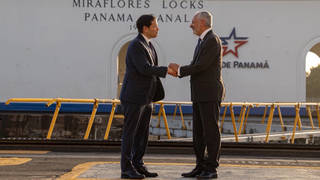
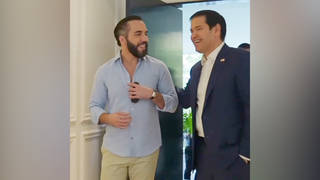
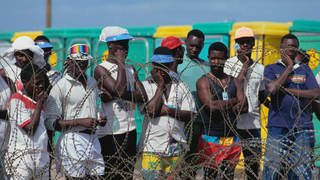
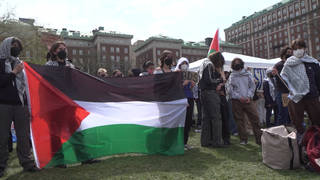






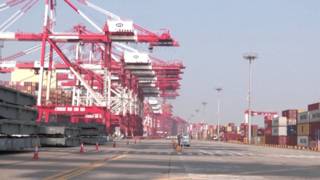
Media Options